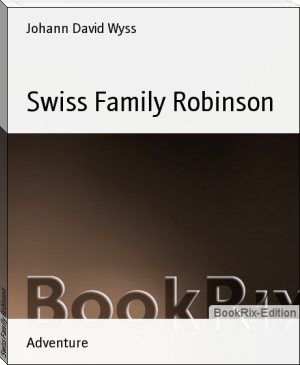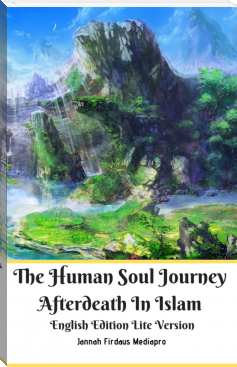Swiss Family Robinson - Johann David Wyss (poetry books to read txt) 📗

- Author: Johann David Wyss
- Performer: -
Book online «Swiss Family Robinson - Johann David Wyss (poetry books to read txt) 📗». Author Johann David Wyss
`Must you really go again to that dreadful wreck?’ said my wife
shuddering. `You have no idea how anxious I am when you are away
there.’
`Go we must, I am afraid,’ I replied, `but not for a day or two yet.
Come, it is getting late. We and the chickens must go to roost.’
We lit our watch fires, and, leaving the dogs on guard below, ascended
the ladder. Fritz, Ernest and Jack were up in a moment.
Their mother followed very cautiously, for though she had originated
the idea of building a nest, she yet hesitated to entrust herself at
such a terrific height from the ground. When she was safely landed in
the house, taking little Franz on my back, I let go the fastenings
which secured the lower end of the ladder to the ground, and swinging
to and fro, slowly ascended.
Then for the first time we stood all together in our new home. I drew
up the ladder, and, with a greater sense of security than I had enjoyed
since we landed on the island, offered up our evening prayer, and
retired for the night.
Next morning all were early awake, and the children sprang about the
tree like young monkeys.
`What shall we begin to do, father?’ they cried. `What do you want us
to do, today?’
`Rest, my boys,’ I replied, `rest.’
`Rest?’ repeated they. `Why should we rest?’
`“Six days shalt thou labour and do all that thou hast to do, but on
the seventh, thou shalt do no manner of work.” This is the seventh
day,’ I replied, `on it, therefore, let us rest.’
`What, is it really Sunday?’ said Jack, `How jolly! Oh, I won’t do any
work; but I’ll take a bow and arrow and shoot, and we’ll climb about
the tree and have fun all day.’
`That is not resting,’ said I, `that is not the way you are accustomed
to spend the Lord’s day.’
`No! But then we can’t go to church here, and there is nothing else to
do.’
`We can worship here as well as at home,’ said I.
`But there is no church, no clergyman and no organ,’ said Franz.
`The leafy shade of this great tree is far more beautiful than any
church,’ I said, `there will we worship our Creator. Come, boys, down
with you: turn our dining hall into a breakfast room.’
The children, one by one, slipped down the ladder.
`My dear Elizabeth,’ said I, `this morning we will devote to the
service of the Lord, and by means of a parable, I will endeavor to give
the children some serious thought; but, without books, or the
possibility of any of the usual Sunday occupations, we cannot keep them
quiet the whole day; afterward, therefore I shall allow them to pursue
any innocent recreation they choose, and in the cool of the evening we
will take a walk.’
My wife entirely agreed with my proposal, and having breakfasted, the
family assembled round me, as we sat in the pleasant shade on the
fresh, soft grass.
After singing some hymns and offering heartfelt prayers to the
Almighty Giver of all good, I told the children I would relate to them
a parable instead of preaching a sermon.
`Oh, that would be delightful! I like the parables in the Bible better
than anything,’ said Franz. `When can we hear you read out of the Bible
again, father?’
`Ah, my little boy, your words reproach me,’ returned I. `While
eagerly striving to procure from the ship would feed our bodies and
provide for their comfort, I blush to think that I have neglected the
Bread of Life, the word of God. I shall search for a Bible on my next
return to the wreck: although our own books were nearly all destroyed,
I am pretty sure to find one.’
At these words my wife arose, and fetching her magic bag, she drew from
it a copy of the Holy Scriptures, which I thankfully received from her
hand; and after reading aloud from its sacred pages, I spoke as
follows:
`A Great King, ruling in power and splendor over a vast realm of light
and love, possessed within its boundaries a desolate and unfruitful
island. This spot he made the object of his special care; and,
lavishing on it all the varied resources of his might and goodness, it
bloomed in beauty, and became the happy residence of a band of
colonists, who were charged not only with the cultivation and
improvement of the soil, but each, individually, was bound to cherish
in his soul the spirit of love and true allegiance to his Sovereign.
`While this faithful union was maintained, the colony flourished; and
the noblest virtues exalted and rendered happy the existence of every
member of the race.
`That a discontented and rebellious spirit should ever have infected
these fortunate subjects of so loving a master, seems incredible, yet
it was so; disobedience and pride brought misery and punishment, the
fair prospects of the colony were blighted, the labours of the
colonists were unblessed, and total separation from the parent kingdom
seemed inevitable.
`A message of pardon—of free forgiveness—was nevertheless accorded to
these rebels; and to all who, humbly accepting it, molded their future
lives to the will of the Great King (now revealed in a character even
more gracious than before), was held out the promise of removal at last
from among the ruins caused by the great rebellion, to the glory and
undimmed splendor of the realm of Light and Blessedness.’
Having interested the children, I then, leaving allegory, pressed
simply and earnestly home to each young heart the truths I sought to
teach; and, with a short prayer for a blessing on my words, brought the
service to a close.
After a thoughtful pause, we separated, and each employed himself as he
felt disposed.
I took some arrows, and endeavoured to point them with porcupine
quills.
Franz came to beg me make a little bow and arrow for him to shoot
with, while Fritz asked my advice about the tiger-cat skin and the
cases he was to contrive from it. Jack assisted with the arrow-making,
and inserting a sharp spine at one end of each reed made it fast with
pack-thread, and began to wish for glue to ensure its remaining firm.
`Oh, Jack! Mamma’s soup is as sticky as anything!’ cried Franz. `Shall
I run and ask for a cake of it?’
`No, no, little goose! Better look for some real glue in the
tool-box.’
`There he will find glue, to be sure,’ said I, `and the soup would
scarcely have answered your purpose. But Jack, my boy, I do not like to
hear you ridicule your little brother’s idea. Some of the most valuable
discoveries have been the result of thoughts which originally appeared
no wiser than his.’
While thus directing and assisting my sons, we were surprised by
hearing a shot just over heads; at the same moment two small birds fell
dead at our feet, and looking up, we beheld Ernest among the branches,
as bending his face joyfully towards us, he cried, `Well hit! Well hit!
A good shot, wasn’t it?’
Then slipping down the ladder, and picking up the birds, he brought
them to me. One was a kind of thrush, the other a small dove called the
ortolan, and esteemed a very great delicacy on account of its exquisite
flavour.
As the figs on which these birds came to feed were only just beginning
to ripen, it was probable that they would soon flock in numbers to our
trees; and by waiting until we could procure them in large quantities,
we might provide ourselves with valuable food for the rainy season, by
placing them, when half cooked, in casks with melted lard or butter
poured over them.
By this time Jack had pointed a good supply of arrows, and
industriously practised archery. I finished the bow and arrows for
Franz, and expected to be left in peace; but the young man next
demanded a quiver, and I had to invent that also, to complete his
equipment. It was easily done by stripping a piece of bark from a small
tree, fitting a flat side and a bottom to it, and then a string.
Attaching it to his shoulders, the youthful hunter filled it with
arrows and went off; looking, as his mother said, like an innocent
little Cupid, bent on conquest.
Not long after this, we were summoned to dinner, and all right
willingly obeyed the call.
During the meal I interested the boys very much by proposing to decide
on suitable names for the different spots we had visited on this coast.
`For,’ said I, `it will become more and more troublesome to explain
what we mean, unless we do so. Besides which, we shall feel much more
at home if we can talk as people do in inhabited countries: instead of
saying, for instance, “the little island at the mouth of our bay, where
we found the dead shark”, “the large stream near our tent, across which
we made the bridge”, “that wood where we found cocoanuts, and caught
the monkey”, and so on. Let us begin by naming the bay in which we
landed. What shall we call it?’
`Oyster Bay,’ said Fritz.
`No, no!—Lobster Bay,’ cried Jack, `in memory of the old fellow who
took a fancy to my leg!’
`I think,’ observed his mother, `that, in token of gratitude for our
escape, we should call it Safety Bay.’
This name met with general approbation, and was forthwith fixed upon.
Other names were quickly chosen. Our first place of abode we called
Tentholm; the islet in the bay, Shark’s Island; and the reedy swamp,
Flamingo Marsh. It was some time before the serious question of a name
for our leafy castle could be decided. But finally it was entitled
Falconhurst; and we then rapidly named the few remaining points:
Prospect Hill, the eminence we first ascended; Cape Disappointment,
from whose rocky heights we had strained our eyes in vain search for
our ship’s company; and Jackal River, as a name for the large stream at
our landing place, concluded our geographical nomenclature.
In the afternoon the boys went on with their various employments.
Fritz finished his cases, and Jack asked my assistance in carrying out
his plan of making a cuirass for Turk, out of the porcupine skin. After
thoroughly cleansing the inside, we cut and fitted it round the body of
the patient dog; then when strings were sewn on, and it became
tolerably dry, he was armed with this ingenious coat of mail, and a
most singular figure he cut!
Juno strongly objected to his friendly approaches, and got out of his
way so fast as she could; and it was clear that he would easily put to
flight the fiercest animal he might encounter, while protected by
armour at once defensive and offensive. I determined to make also a
helmet for Jack out of the remainder of the skin, which to his infinite
delight I speedily did.
Amid these interesting occupations the evening drew on, and after a
pleasant walk among the sweet glades near our abode, we closed our
Sabbath day with prayer and a glad hymn of praise, retiring to rest
with peaceful hearts.
Next morning, I proposed an expedition to Tentholm, saying I wished to
make my way thither by a different route. We left the tree well armed;
I and my three elder sons each carrying a gun and game-bag, while
little





Comments (0)